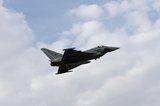UK awards F-35 missile contract
The UK Ministry of Defence (MoD) has awarded a £411 million contract to MBDA for developing a new missile for its F-35B future supersonic stealth aircraft, it announced on 18 May.
Work under the contract will take place at MBDA's Stevenage, Bristol and Lostock sites. The company will develop Spear 3, a missile that is part of the same weapons family as Brimstone, which is currently used by the Royal Air Force (RAF). The Spear 3 is expected to have a wider range and greater destructive force than the Brimstone.
The MBDA contract covers four years of critical design and development for tailoring the Spear 3 for use in the F-35B's internal weapons bay. Specifically, the missile will be designed for the F-35B Lightning II aircraft to be operated from the HMS Queen Elizabeth and HMS Prince of Wales, the two new Queen Elizabeth-class aircraft carriers currently under construction for the navy.
Spear 3 features a turbojet engine instead of a conventional rocket motor, enabling a range of over 60 miles. It was test fired successfully from an RAF Typhoon aircraft at a range in West Wales in March 2016.
The contract comes after an £150 million initial assessment phase. If successful, the Spear 3 is expected to enter service in the mid-2020s.
Philip Dunne, Defence Minister, MoD, said: 'This contract will give UK pilots a state-of-the-art British designed weapon to be used on board our next-generation F-35B jets, with the precision and punch that we need to give decisive operational advantage over our adversaries and keep Britain safe.'
More from Defence Notes
-
![High tension in the High North – a wake-up call for NATO’s future Arctic defence efforts?]()
High tension in the High North – a wake-up call for NATO’s future Arctic defence efforts?
Any potential ‘Arctic Sentry’ mission would be months in the planning, but with tensions high in the region given the US’s push for Greenland, NATO countries will need to continue to emphasise their commitment to the region, analysts have said.
-
![Venezuela prepares personnel and equipment for a potential second US attack]()
Venezuela prepares personnel and equipment for a potential second US attack
Defence Minister Gen Vladimir Padrino López has declared that the Venezuelan armed forces “will continue to employ all its available capabilities for military defence”.
-
![As the new year starts, the UK defence spending delay continues]()
As the new year starts, the UK defence spending delay continues
The UK’s defence spending commitments remain uncertain as the government’s Defence Investment Plan, which had been due by the end of 2025, is yet to be published.
-
![How might European countries look to tackle drone incursions?]()
How might European countries look to tackle drone incursions?
Disruption of infrastructure in Europe, whether by cyberattack, physical damage to pipelines or uncrewed aerial vehicles flying over major airports, as has happened more recently, is on the rise. What is the most effective way of countering the aerial aspect of this not-so-open warfare?
-
![Taiwan approved for $11 billion weapon purchase from US]()
Taiwan approved for $11 billion weapon purchase from US
The US State Department’s approval of a multi-billion-dollar sale of weapons to Taiwan includes tactical mission networks equipment, uncrewed aerial systems, artillery rocket systems and self-propelled howitzers as well as anti-tank guided missiles.
-
![Ireland spells out $2.3 billion shopping list in five-year defence spending plan]()
Ireland spells out $2.3 billion shopping list in five-year defence spending plan
Ireland’s multi-annual investment in capital defence spending is set to rise from €300m in 2026 to €360m in 2029–2030 with major upgrades across land, air, maritime and cyber domains.



























